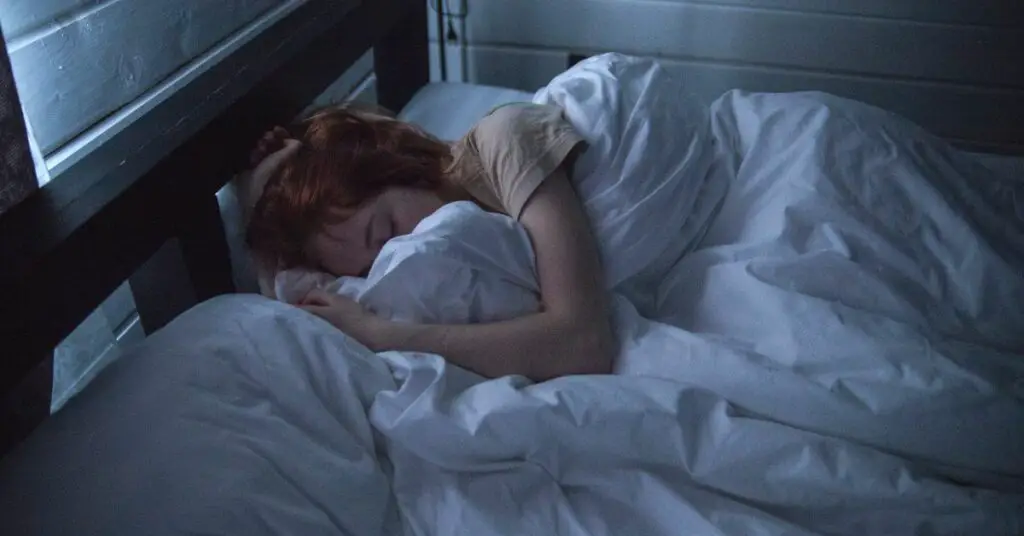Weighted blankets have become a popular way to help people relax and get a good night’s sleep.
The blankets are filled with small beads or pellets that add weight to the blanket. Some people wonder whether weighted blankets help with sleep paralysis.
The truth is that there is some anecdotal evidence that weighted blankets can help those with sleep paralysis to manage the condition better.
In this article, we’ll explore the research behind weighted blankets and sleep paralysis, as well as whether a weighted blanket can help you get a good night’s sleep.
What is Sleep Paralysis?
Sleep paralysis is a condition in which a person is unable to move or speak for a short period of time. It can occur when you are falling asleep or waking up. Sleep paralysis may be accompanied by frightening hallucinations.
Most people who have sleep paralysis do not have any underlying medical condition. However, it may be more likely to occur if you have a sleep disorder, such as narcolepsy.
Sleep paralysis is not harmful and usually goes away on its own. However, it can be very frightening. If you experience sleep paralysis frequently, you may want to see a doctor to rule out any underlying medical conditions.
The Symptoms of Sleep Paralysis
Most people have experienced waking up feeling paralyzed at some point in their lives. This phenomenon is called sleep paralysis, and it is relatively common. Sleep paralysis can be a very frightening experience, but it is not dangerous.
There are two types of sleep paralysis: isolated sleep paralysis and recurrent isolated sleep paralysis. Isolated sleep paralysis happens to people who do not have any other sleep disorders. Recurrent isolated sleep paralysis happens to people who have other sleep disorders, such as narcolepsy.
There are several different symptoms of sleep paralysis. The most common symptom is the feeling of being paralyzed. This can happen when you are falling asleep or waking up. You may also feel like there is someone in the room with you or that you are being suffocated. You may also see or hear things that are not there.
Sleep paralysis is usually harmless, but it can be very frightening. If you experience sleep paralysis, try to stay calm and breathe slowly and deeply.
Sleep paralysis usually goes away on its own within a few minutes. If you are having recurrent episodes of sleep paralysis, you should see a doctor rule out any underlying sleep disorders.
Tips For Using a Weighted Blanket to Help With Sleep Paralysis
Sleep paralysis can be a frightening experience. You may feel like you can’t move or speak, and sometimes you may even see or feel things that aren’t really there.
A weighted blanket can help ease the symptoms of sleep paralysis by providing deep pressure stimulation. This type of stimulation has a calming effect on the nervous system, which can help you feel more relaxed and less anxious.
Here are some tips for using a weighted blanket to help with sleep paralysis:
1. Choose a blanket that is the right weight for you.
2. Place the blanket on your bed before you go to sleep.
3. Get into bed and make sure the blanket is evenly distributed over your body.
4. If you start to feel anxious or panicky, focus on your breath and try to relax.
5. If you wake up during the night, don’t be alarmed if you feel the blanket on top of you. Just take a few deep breaths and try to go back to sleep.
Sleep paralysis can be a scary experience, but a weighted blanket can help ease the symptoms. By following these tips, you can make sure that you get the most out of your blanket and get a good night’s sleep.
***
Are There Any Risks Associated With Using a Weighted Blanket to Help With Sleep Paralysis?
While there is no known cure for sleep paralysis, there are some treatments that can help lessen the symptoms. One such treatment is using a weighted blanket.
Weighted blankets are becoming increasingly popular as a way to help with sleep paralysis and other sleep disorders. But are there any risks associated with using a weighted blanket?
There is no evidence to suggest that weighted blankets are unsafe. However, some people may find them uncomfortable or claustrophobic. If you have any concerns, speak to your doctor or a sleep specialist before using a weighted blanket.
Weighted blankets have been shown to be effective in treating a variety of sleep disorders, including insomnia, restless legs syndrome, and night terrors. If you are struggling with sleep paralysis, a weighted blanket may be worth considering as a treatment option.
However, as with any treatment, there is always the potential for side effects. Be sure to speak to your doctor before starting any new treatment.
How to Choose The Right Weighted Blanket For You?
There are a few things to consider when choosing the right weighted blanket for you.
First, consider the weight of the blanket. Weighted blankets typically range from 4-30 pounds. The weight of the blanket should be evenly distributed across the entire surface.
Body Weight RangeWeighted Blanket Weight Range
25-60 lbs. 2-6 lbs.
35-84 lbs. 3-8 lbs.
50-120 lbs. 5-12 lbs.
60-144 lbs. 6-14 lbs.
Second, choose a material that is breathable and comfortable. Weighted blankets are typically made from cotton or polyester.
Finally, consider the size of the blanket. Weighted blankets should be large enough to cover the entire body. However, they should not be so large that they are cumbersome or difficult to move around in.
If you have any questions about choosing the right weighted blanket for you, be sure to speak to your doctor or a sleep specialist.
Frequently Asked Questions Related to Weighted Blankets And Sleep Paralysis
1. Who should not use a weighted blanket?
It’s generally advised that you consult with a doctor before using a weighted blanket if you have any of the following health issues: respiratory or circulatory issues, low blood pressure, or asthma.
That being said, weighted blankets can be beneficial for people who suffer from anxiety, insomnia, PTSD, and chronic pain.
If you suffer from any of these conditions, it’s important to weigh the pros and cons of using a weighted blanket with your doctor to decide if it’s right for you.
There are also different types of weighted blankets on the market, so be sure to do your research before purchasing one!
2. Do weighted blankets help with sleep problems?
Weighted blankets have been shown to help people with sleep problems by providing a feeling of security and comfort.
The added weight of the blanket helps to provide a sense of calm and relaxation, which can be beneficial for those who suffer from anxiety or insomnia.
Some research has also shown that weighted blankets can help to reduce the severity of night terrors.
While there is no one-size-fits-all solution for sleep problems, weighted blankets can definitely help to manage the situation and improve overall sleep quality.
3. Can you get sleep paralysis from a weighted blanket?
Weighted blankets are often recommended for people with sleep paralysis because they can help to reduce anxiousness and promote deep, restful sleep.
However, there is no evidence that weighted blankets cause or worsen sleep paralysis. In fact, weighted blankets may actually help manage the condition by reducing anxiety and promoting deep, restful sleep.
If you experience occasional episodes of sleep paralysis, a weighted blanket may be worth considering as a potential treatment option.












